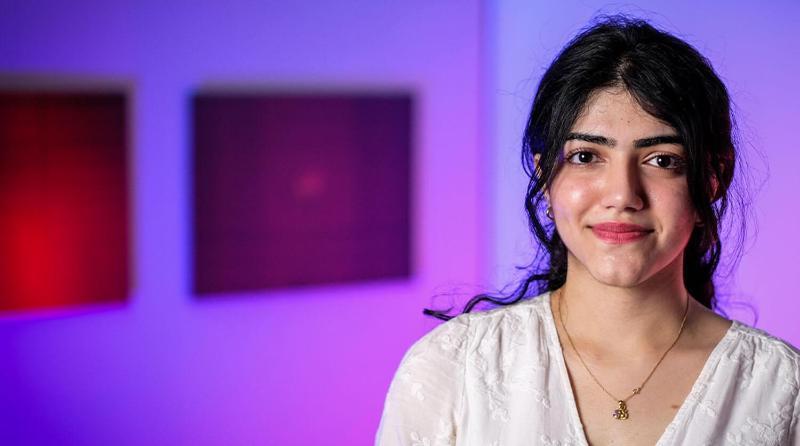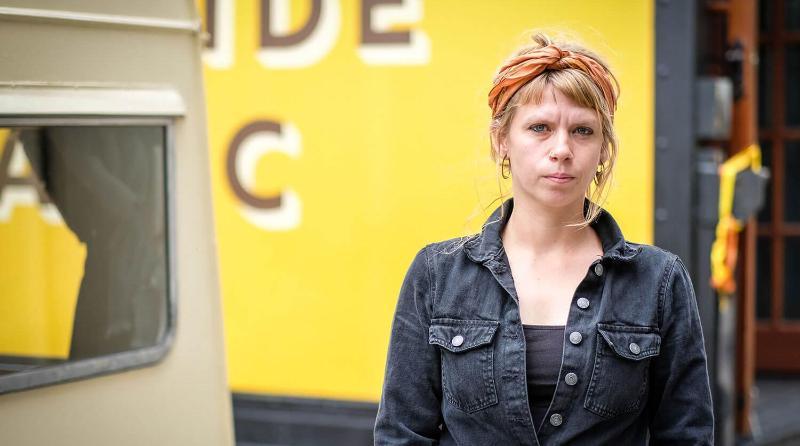A studio-centred fine arts degree, encouraging independent enquiry and delivered by practising artists.
- Excellent studios, making spaces, technical support and workshops.
- Exceptional academic and technical support in painting, sculpture, printmaking, drawing, film, sound, performance and photography.
- Outstanding programme of visiting speakers, including internationally acclaimed artists and curators.
#1 in South West
and Top 10 in the UK for Graduate Prospects in Fine Art (Guardian University Guide 2026)
#1 in South West
for Continuation in Fine Art (Guardian University Guide 2026)
Joint #1 in South West
and #12 in the UK for Value Added in Fine Art (Guardian University Guide 2026)
#2 in South West
in the overall rankings for Fine Art (Guardian University Guide 2026)
This studio-centred course offers you the opportunity to explore the disciplines of painting, sculpture, performance, installation, printmaking, and lens-based and digital media.
The Fine Art course is characterised by a profound synergy between academic and technical teaching and learning. You'll work towards an independent, critical and reflective practice, supported through tutorials, workshops, lectures, study trips and, in the first year, weekly contact with your Academic Advisor.
Our lecturers are engaged in their own practice as artists, bringing a contagious energy to the dialogue and exchange with students. In this community, students, tutors and dedicated technicians work together to understand and develop what contemporary art can or should be today.
You’ll develop the skills you need for a successful career – as an artist or in a related profession.
"Within the Fine Art course, there is a great relationship between the making and the thinking, and a huge emphasis on the ‘doing’ and the ‘stuff’ involved in contemporary art.
I learnt how to treat being an artist as a job, how to go in everyday and work hard, what it means to even have a studio, how to get myself un-stuck, how to write about my work, how to become an expert in my own field and above all how to problem solve."
Holly Nicholls, graduate
Follow us on Instagram!
See what our BA Fine Art staff and students are up to by following @bath_bafineart on Instagram.
Need advice on putting together your portfolio? See our portfolio guidance for applicants.
Study options
The preliminary and intensive Integrated Foundation in Art and Design is designed to develop your ideas, skills and confidence in readiness for progressing to year one of your degree programme.
This year provides you with the opportunity to identify, apply for, and secure professional experience, normally comprising one to three placements over a minimum of nine months. Successful completion of this module will demonstrate your ability to secure and sustain graduate-level employment.
By completing the module, you'll be entitled to the addition of 'with Professional Placement Year' to your degree title.
Before your Professional Placement Year, you'll work to secure your placement, constructing a development plan with your module leader and your placement coordinator from our Careers and Employability team.
On your return to University for your final year, you'll submit your Placement Portfolio, detailing your development on your placement, for assessment.
What you'll learn
The course is aimed at the development of studio practice in painting, drawing, sculpture, film, photography, performance and sound. The structure of the course leaves room for not knowing, experimentation, discovery, risk and innovation.
This course promotes curiosity, risk and innovation. It aims to develop your skills of analysis, self-criticism, reflection and communication – both verbally and visually – as well as the practical skills you need.
It is critical that you understand current and historical debates in art, and through a programme of Contextual Studies we encourage you to consider how theory and contextual knowledge is embedded in practice.
Throughout the course, you will acquire the skills you need to build a successful future. Taught sessions support you to photograph work, build blogs/websites, write artist statements, fundraise, network, manage projects and curate exhibitions.
Year one
Experimentation with materials, techniques and processes are foregrounded. You'll establish a way of working that is playful and analytical. Through this process you'll begin to recognise the themes that are emerging in your work. The year is filled with a range of inductions and workshops to support your practice.
Year two
This is a pivotal period of development in which we will support you to progress your ideas, conceptual strategies and processes. Experimentation remains key, alongside a greater emphasis on individual research, reflection and analysis. We will encourage you to develop a more focused awareness of the debates that surround your practice and continually test its boundaries and possibilities. Off-site exhibitions, projects and other initiatives support you to consider your work beyond the studio.
Year three
You'll build on and extend the ideas you explored in the previous year. As a final year student, greater emphasis is placed not only on a body of resolved, considered and well executed work, but also on work that is ambitious and takes risks. At the end of the year, you'll present work in a degree show that is open to the public.
The course is made up of summative and formative assessments. Formative assessment takes place with the work in the studio and is ongoing throughout the duration of the course. Feedback is given verbally and through written reports from a personal tutor. Summative assessments take place at the end of modules. Assessments take the form of a presented body of work, an exhibition, reflective/academic text or live presentations.
Teaching takes the form of one-to-one tutorials, group critiques, academic workshops, seminars, lectures and forums.
Our visiting lecture series is fundamental to our course and we are proud of the range of speakers we attract. Internationally acclaimed artists, curators and arts professionals give talks about their work, teach in the studios or deliver an exciting range of workshops driven by their research interests.
All the teaching team are engaged in their own practice and this is critical to the philosophy of the course.
To find out more about how we teach and how you'll learn, please read our information on Your Learning and Teaching at BSU.
Course modules
This course offers or includes the following modules. The modules you take will depend on your pathway or course combination (if applicable) as well as any optional or open modules chosen. Please check the programme document for more information.
Modules for the integrated Foundation year option are listed on the Integrated Foundation Year for Art and Design page.
At BSU, our courses are designed to equip our graduates with the knowledge and skills they’ll need for the real world. To do this, we are continually improving our courses by responding to feedback from students and other stakeholders. This may mean changes may be made to the curriculum. You’ll always be given notice of any such changes.
For more information on how we approach such changes at the university, please read our policies on
- Studio Practice: Strategies and Behaviours
- Studio Practice: Investigation and Exploration
- Introduction to Fine Art: Fundamentals
- How Did We Get Here?: Contexts of Art
- Studio Practice: Frameworks and Enquiries
- Studio Practice: Encounters and Audiences
- Exploring Fine Art: Territories
- We Are Here: Art in the 21st Century
- Professional Placement Year
- Studio Practice: In Context (20)
- Studio Practice: In Context (40)
- Studio Practice: Exhibition
- Situating Practice: Final Project
"The best thing about my course is the freedom to create however I choose, with support from wonderful technicians and tutors."
Annabel Garner, student
Opportunities
You can engage in off-site exhibitions throughout your course of study. Sites have previously included abandoned shops or buildings throughout the city or beyond.
After the degree show event at the Bath School of Art, Film and Media, our third year students are supported to take their degree shows to off-site venues. These shows have acted as a springboard for students to attract attention from galleries and other arts professionals.
Study visits play an integral part of the course, and we run one trip per semester for each year group.
Trips have included the Liverpool Biennale, Berlin (artists studio visits), Rome, New York, Venice Biennale, Paris (artists studio visits), Istanbul Biennale and The British Arts Show, Leeds.
Students are selected to take part in a residency on the Cornish coast and produce new work in response to the site. This work forms part of a national touring exhibition.
Our students take up a variety of work placements, internships or opportunities in the creative industry from the ICA, Hauser and Wirth, the Holburne Museum and Spike Island to working as assistants with internationally acclaimed artists or prestigious commissions in nationally acclaimed heritage sites.
Our graduates go on to become, among other things, professional practising self-employed artists, they become curators in established galleries or set up their own artist run spaces. We have alumni who are teachers or work in gallery education; others have gone onto work in conservation, TV, or Art Therapy.
Many of our alumni go onto further study at some of the UK’s top postgraduate courses including the Slade School of Fine Art, Chelsea School of Art and Design, The Royal College of Art, The Royal Academy Schools, Glasgow School of Art and the Courtauld Institute.
If you’re a full-time undergraduate student starting your first year at Bath Spa University, you can apply for the Certificate in Global Citizenship, which you’ll study alongside your degree.
You’ll gain global awareness and add an international dimension to your student experience, and funding is available. On successful completion of the programme, you’ll be awarded a Certificate in Global Citizenship. This is in addition to your degree; it doesn’t change your degree title or results.
Professional placement year
The Professional Placement Year (PPY) provides you with the opportunity to identify, apply for, and secure professional experience, normally comprising one to three placements over a minimum of nine months. Successful completion of this module will demonstrate your ability to secure and sustain graduate-level employment.
By completing the module, you'll be entitled to the addition of 'with Professional Placement Year' to your degree title.
Before your PPY, you'll work to identify roles of interest and secure a placement. The Placements Team will support through timetabled sessions and 1:1 appointments.
As well as completing a minimum of 900 placement hours, you will complete two assessments demonstrating your skill development, growth in professional behaviours and how the PPY has impacted your future career aspirations.
“The inspirational opportunities I was exposed to were way beyond my expectations. The teaching staff enabled me to develop as a practising artist, giving me confidence to explore contemporary art in a playful, exciting and experimental way.”
Jenny Cooper, graduate
Facilities and resources
As a BA Fine Art student you’ll benefit from access to comprehensive digital workshops and specialist art and design facilities, including:
- Our student service point at Locksbrook where you can purchase subsidised art and design materials, hire out equipment for free and collect Library resources
- Access to our well-stocked Library at Newton Park
- Specialist technical workshops across all of art and design
- Access to studio space where you can work on projects and refine your practice.
Throughout the course, you'll have access to a wide range of tutors for tutorials, academic workshops and critiques. All our students have access to exceptional technical facilities, technicians and technical workshops.
You'll have access to our huge range of facilities and resources, including:
- Individual studio spaces
- Gallery space
- Art shop
- Sculpture workshop
- Ceramic design studio
- Clay preparation and kilns
- Glaze laboratory
- Painting methods room
- Plastic workshop
- Metalwork workshop
- Woodwork workshop
- Printmaking – etching, screen print, lithography and letterpress
- Black and white photography workshops
- Wide format digital printing
- Digital imaging suite
- Photography lighting studio
- Bookbinding
- 3D printing
Develop a wealth of indispensable digital skills that you can take into your future career. One of only three Adobe Creative Campuses in the UK, we provide all Bath Spa students with access to the full Adobe Creative Suite, giving you the tools to communicate creatively, whatever your course or chosen professional field.
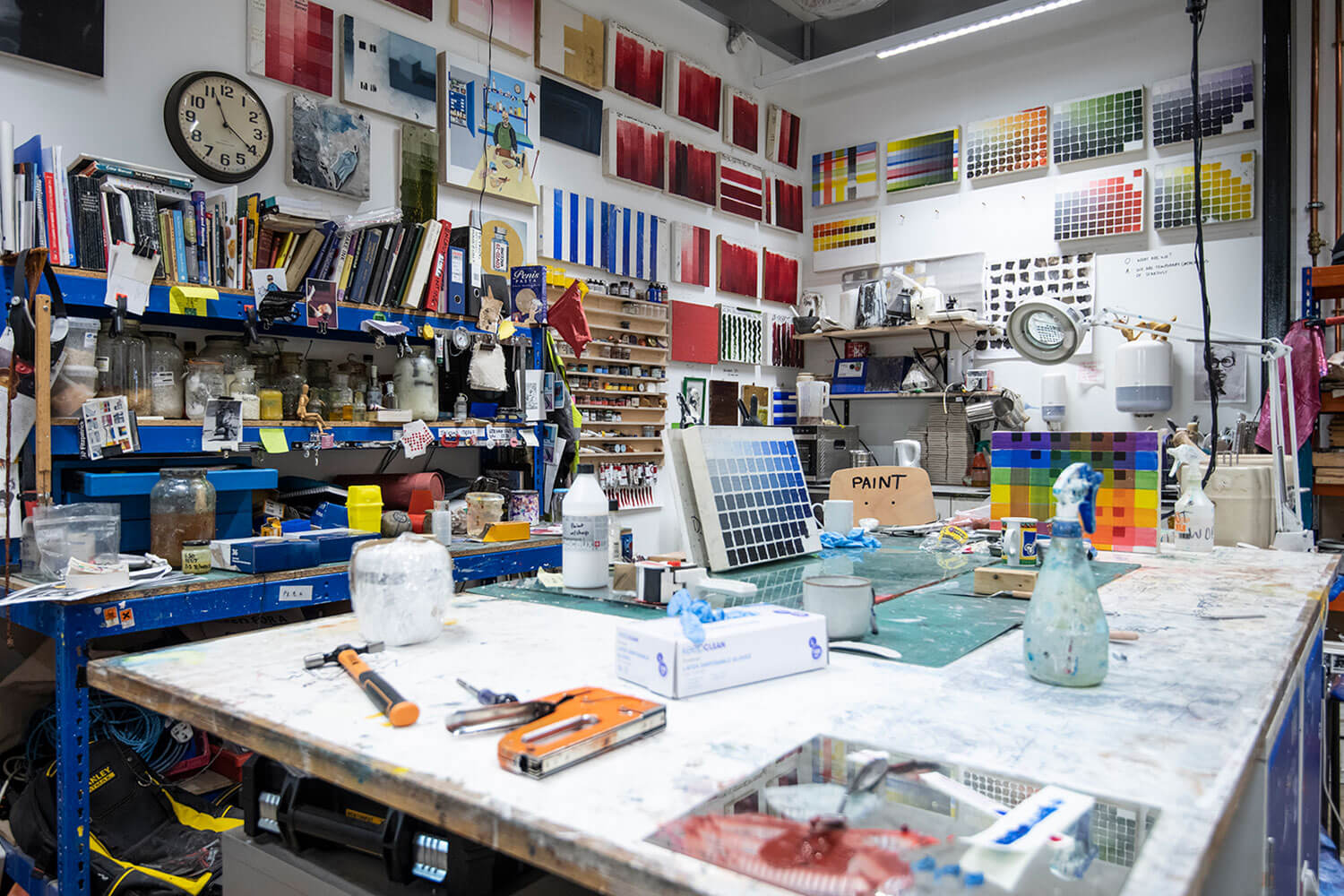
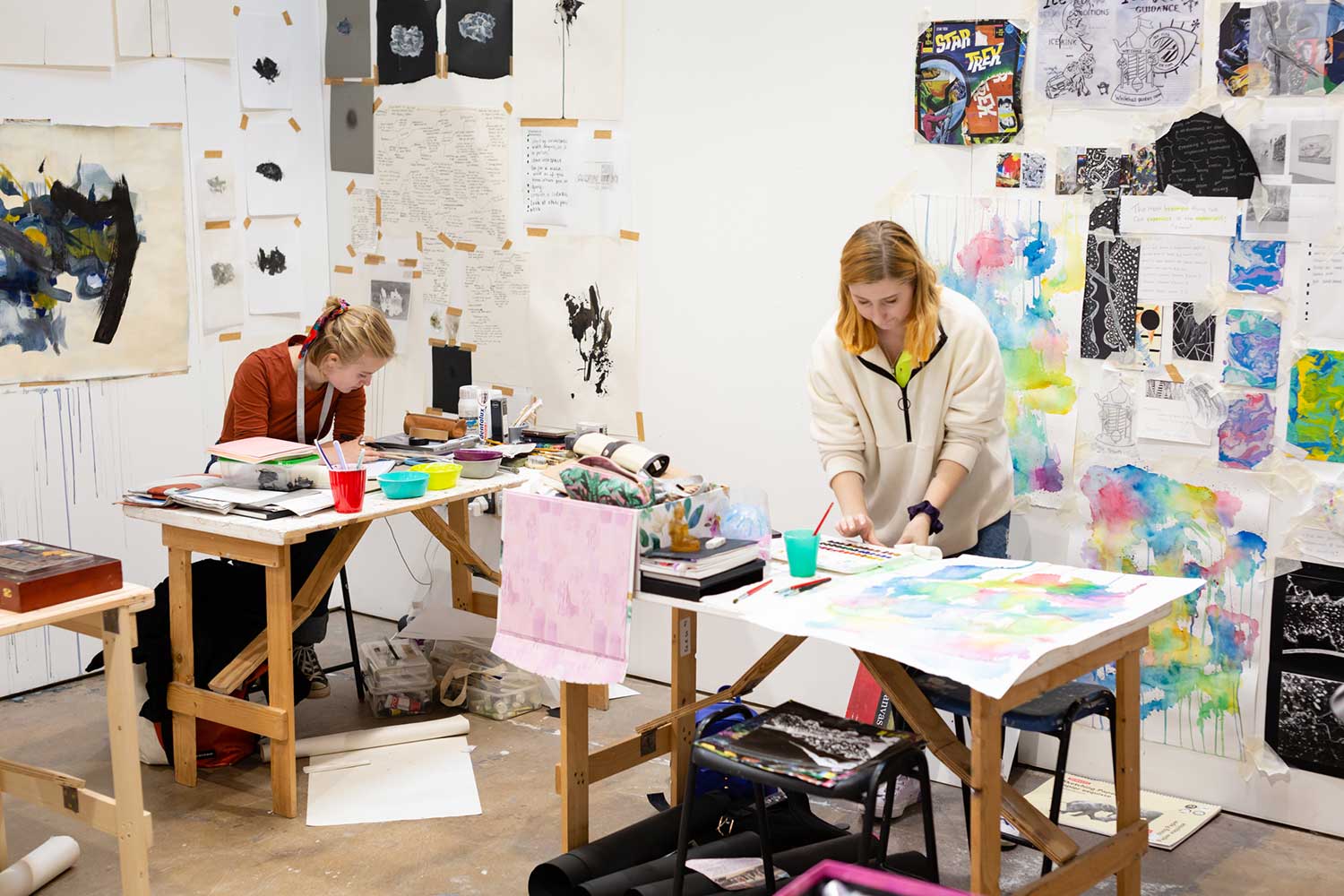
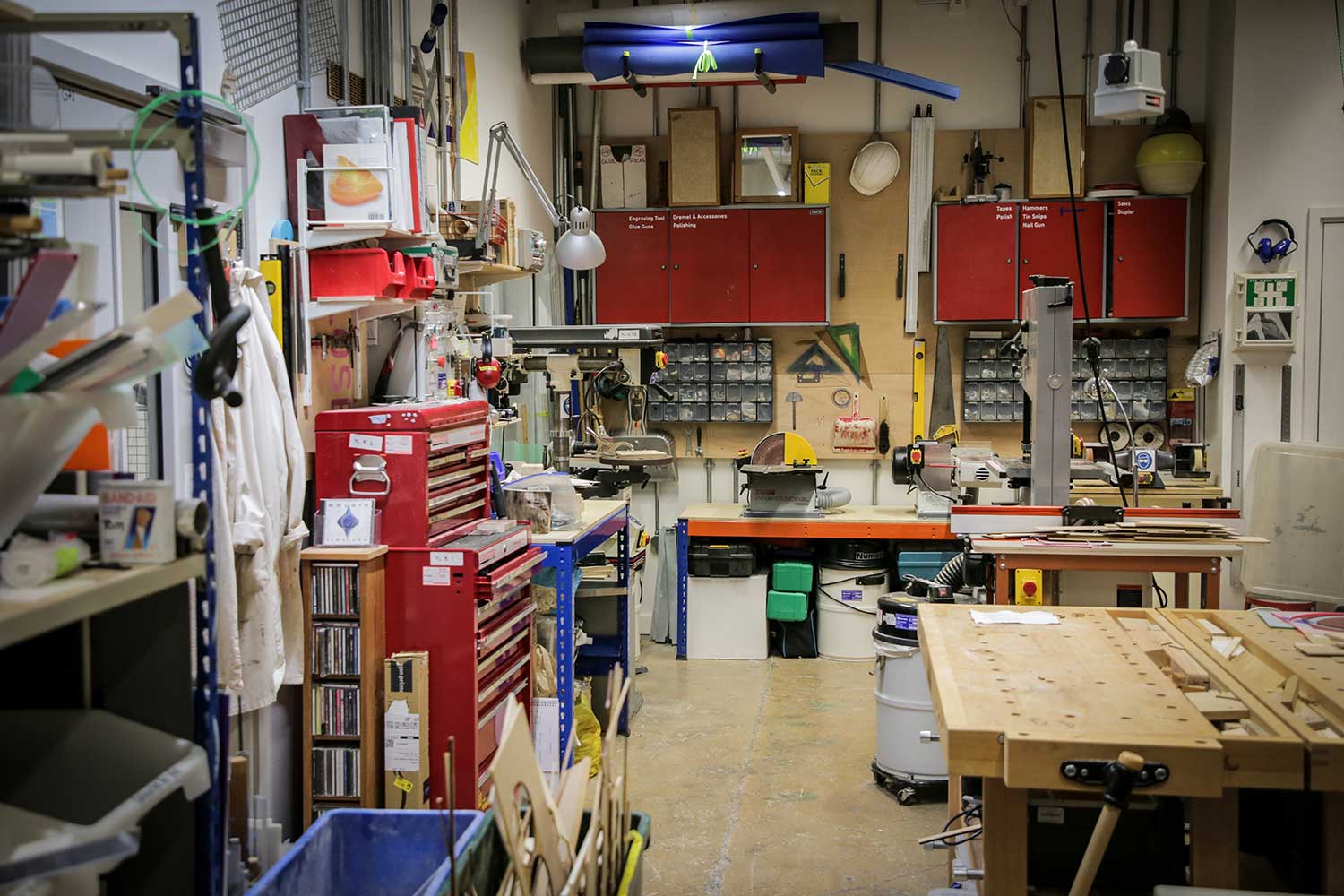
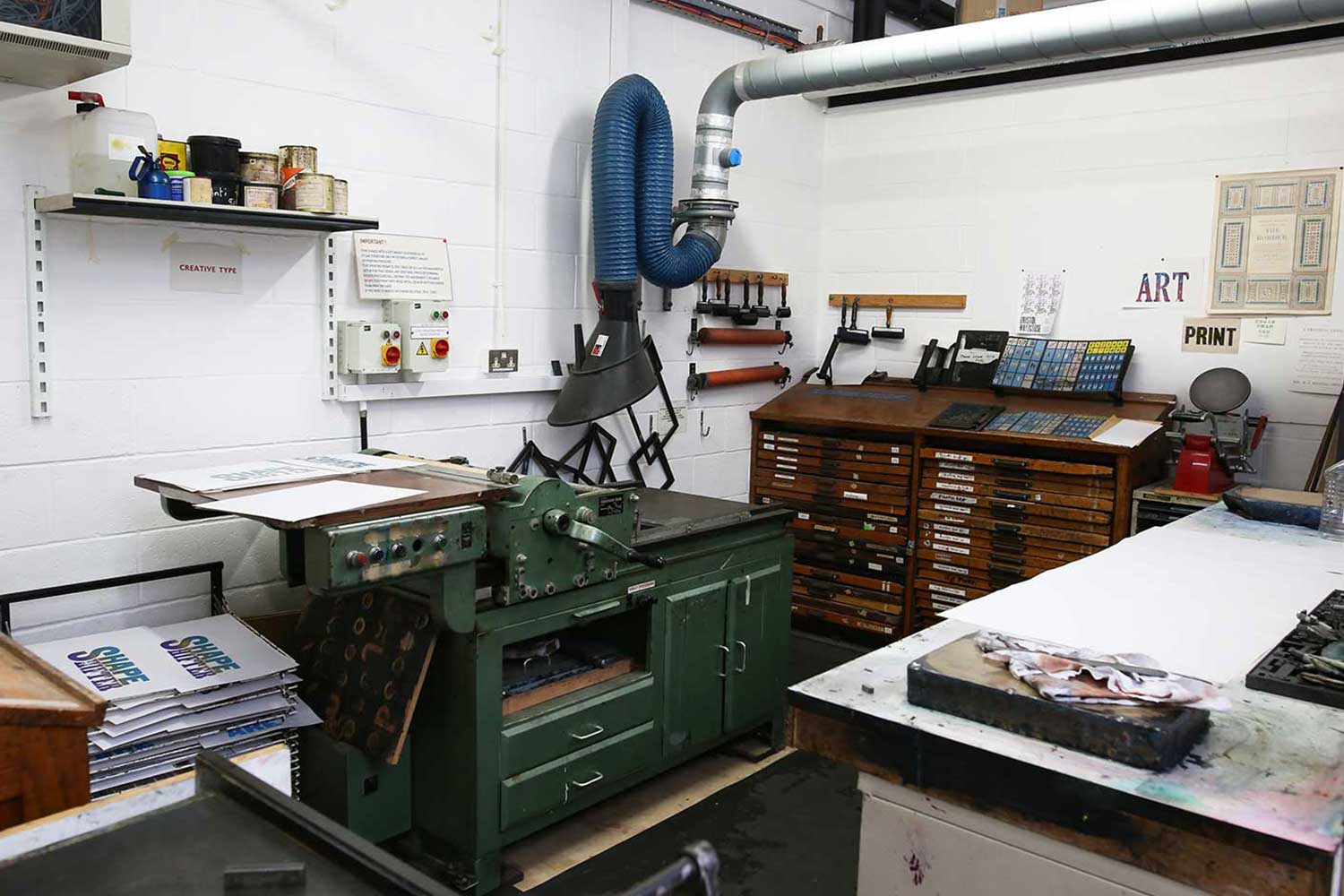
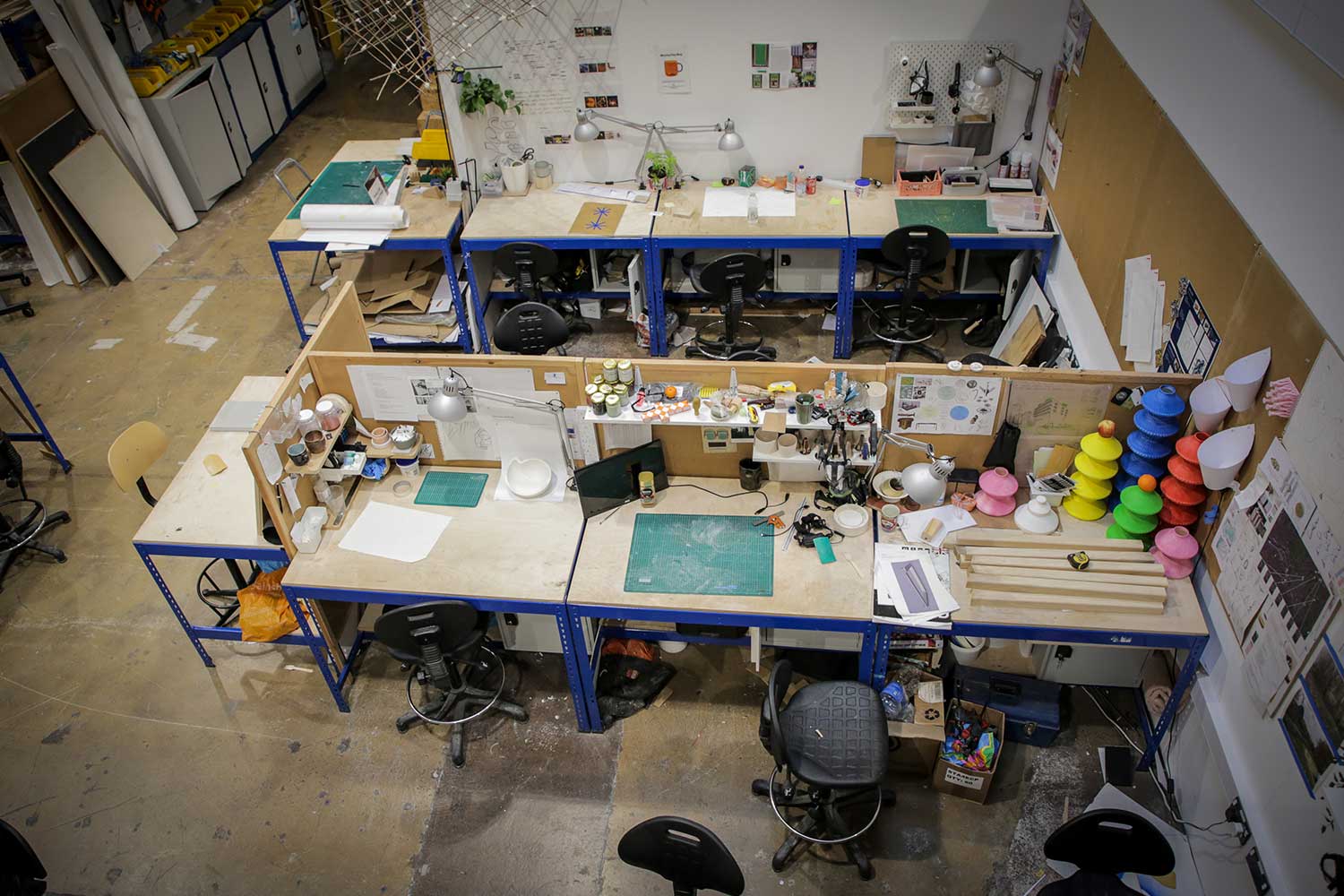
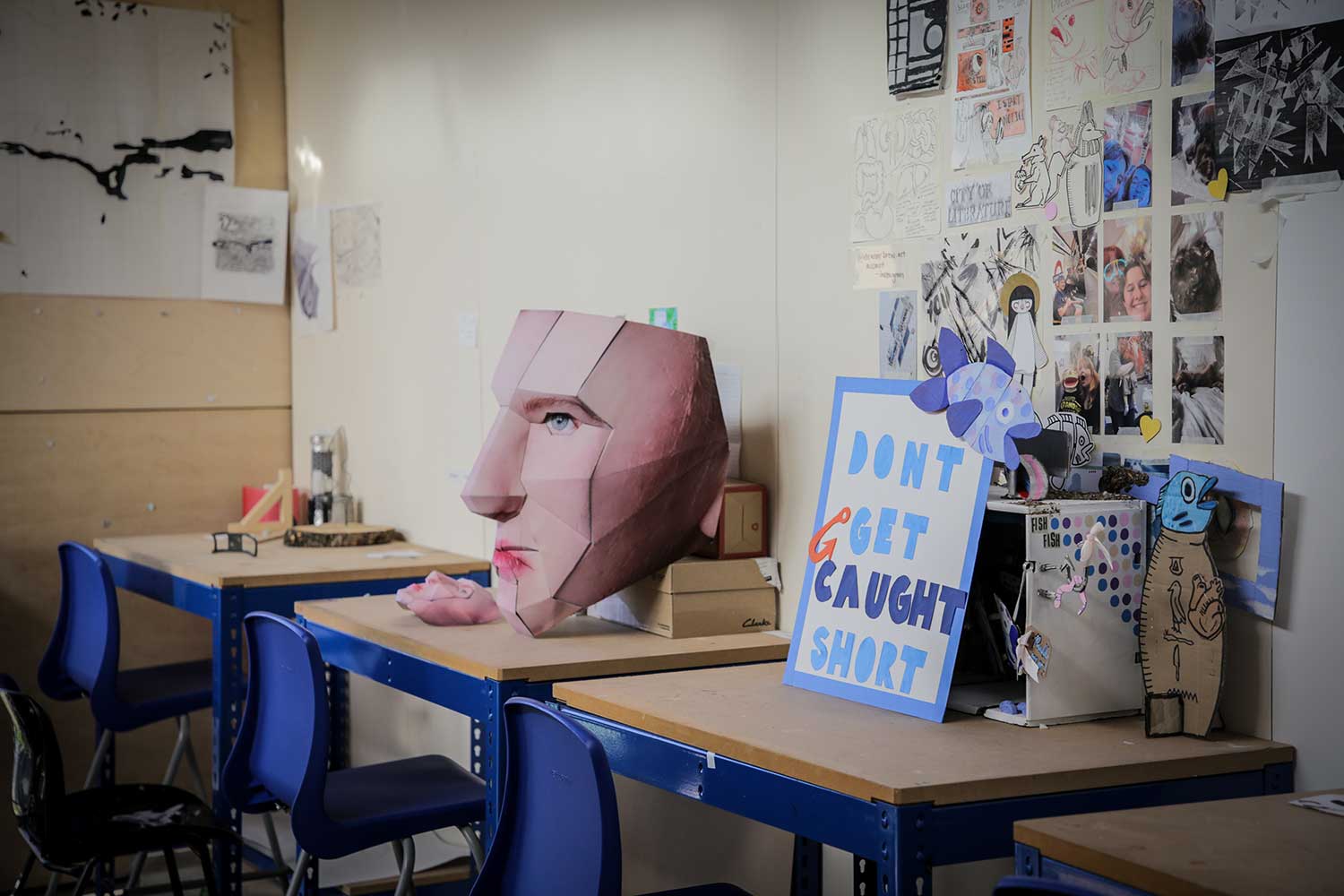
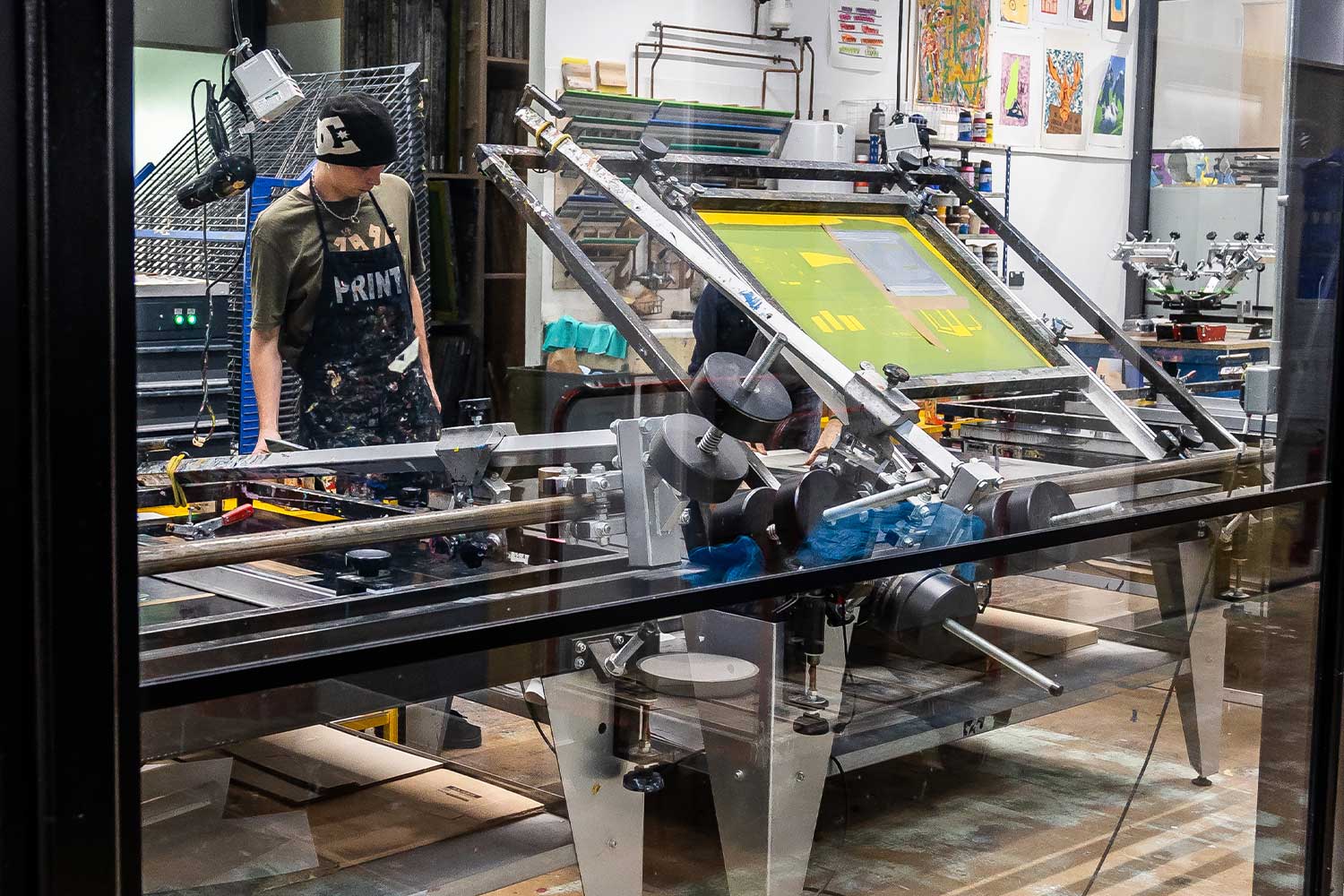
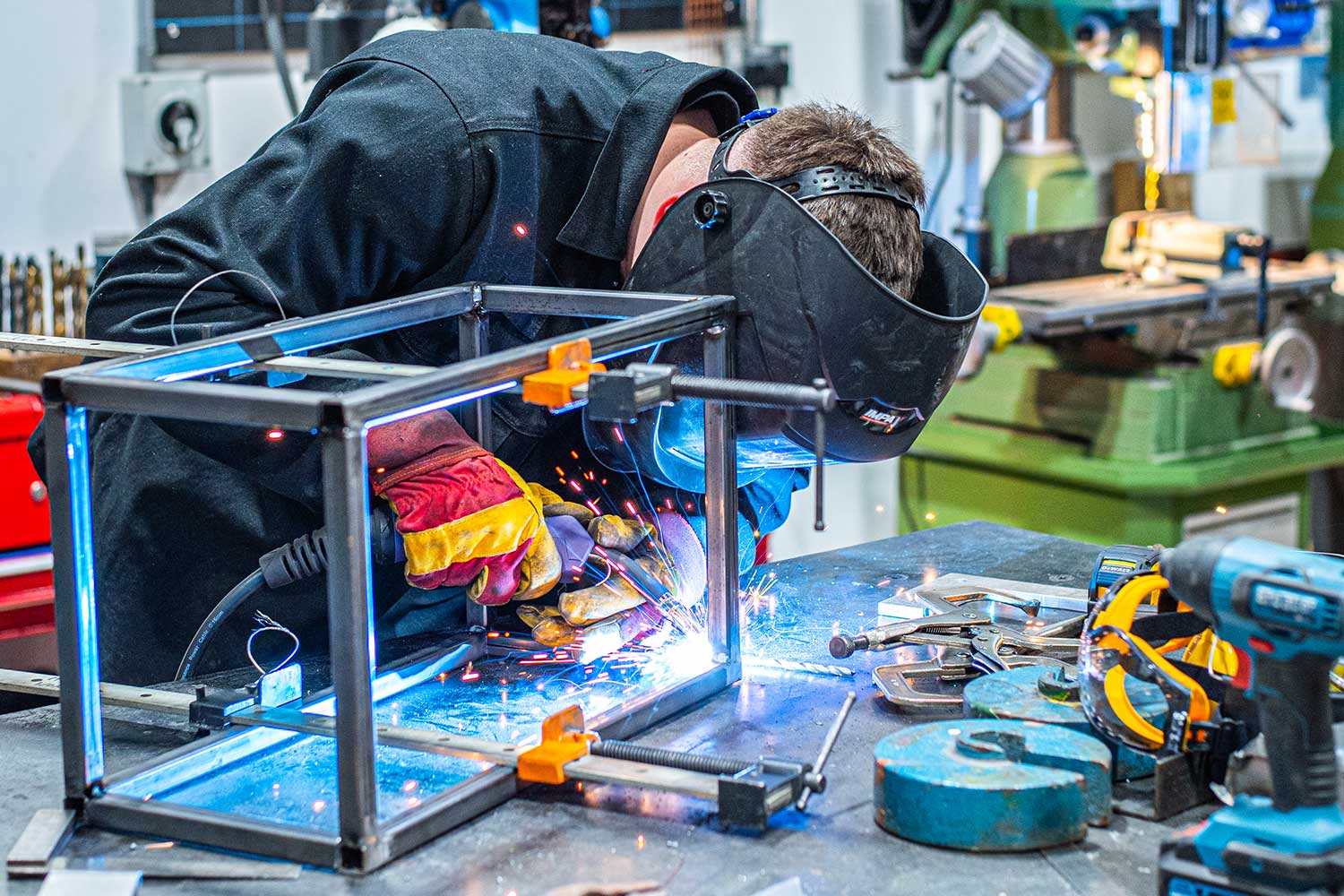
“My Fine Art degree at Bath Spa meant the difference between collecting ideas in notepads and seeing them realised on gallery walls and beyond.”
Trevor Smith, graduate
Locksbrook campus
Locksbrook Campus is a Grade II listed building designed by Nicholas Grimshaw in 1976. It has now been transformed into an innovative, open plan space, redesigned to meet 21st century environmental standards, with technical workshops surrounded by flexible studio spaces and large social areas.
Locksbrook has received both a RIBA South West Award 2021 and RIBA National Award 2021, recognising and celebrating what an amazingly inspirational space it is to come together to design, make, do, create and learn in.
Fees
| Student | Annual tuition fee |
|---|---|
| UK full time | £9,535 |
| UK part time | £4,768 |
| International full time | £19,330 |
Professional Placement Year
During the placement year, the fee is reduced to 20% of the full time fee. This applies to UK and EU/International students.
- UK: £1,905
- International: £3,866
Additional course costs
You may need to pay additional course costs over and above your tuition fees, for example, for specialist equipment or trips and visits. Please check the course Programme Document (linked under the main image on this page) for details of any additional costs. You can also read our Additional Course Costs Policy for further information.
Funding opportunities
Please visit our Funding pages for an overview of the funding options that may be available, including scholarships and bursaries.
Interested in applying?
This course is designed for individuals who are curious, motivated and want to develop their own independent art practices. Applications and places are sought after.
We highly recommend that applicants undertake a pre-degree foundation diploma in Art and Design.
We accept a wide range of qualifications for entry to our undergraduate programmes. The main ones are listed below:
- A Level - grades BBB-BCC. No specific subject required.
- BTEC – Extended Diploma grades from Distinction Distinction Merit (DDM) to Distinction Merit Merit (DMM). No specific subject required.
- T Levels – grade Merit. No specific subject required.
- International Baccalaureate – a minimum of 32 points. No specific subject required.
- Access to HE courses – Access to HE Diploma or Access to HE Certificate (60 credits, 45 of which must be Level 3, at Merit or higher). No specific subject required.
If you don’t meet the entry requirements above, we may be able to accept your prior learning or experience from outside of formal education. See our Accreditation of Prior Learning (APL) page to learn more.
English Language Requirements for International and EU Applicants
IELTS 6.0 - for visa nationals, with a minimum score of IELTS 5.5 in each element.
Course enquiries
For further information about the programme or entry requirements, please email us at admissions@bathspa.ac.uk.
Ready to apply? Click the 'apply now' button in the centre of this page.
Need more guidance? Head to our how to apply webpages.
Applicants for this course will be asked to provide an electronic portfolio of their work.
Full details of what to include will be provided upon initial assessment of the application.
If you have any questions, please contact our Admissions team, quoting the UCAS code given above.
Course leaders:
- Anna Lucas, a.lucas2@bathspa.ac.uk
- Rosie Snell, r.snell@bathspa.ac.uk
